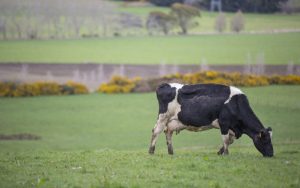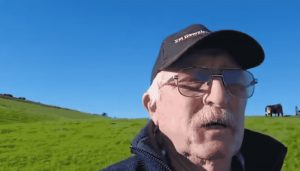
Jacinda Ardern’s plan to cut methane emissions by imposing a tax on New Zealand’s cows and sheep has provoked a furious reaction from the country’s farmers.
The prime minister, who is trailing in opinion polls for an election to be held next year, this week proposed a world-first system to levy taxes on farmers based on the level of emissions from their herds.
The amount due will depend on the number of animals kept, the size of the farm, the type of fertiliser used and any methods used to mitigate methane production.
There are more than five times as many sheep and twice as many cattle as people in New Zealand. Livestock forms the backbone of the country’s large dairy and meat industries but contributes about half of its total emissions. The methane is generated by the ruminants’ digestion and the use of synthetic nitrogen fertilisers in the grass they eat.
Ardern said all money raised by the introduction of the tax in 2025 would be recycled into research and incentives for farmers struggling to reduce the methane contribution of their herds. She also argued that it would put “New Zealand on the best possible footing” to capture a price premium for carbon-neutral meat and dairy products.
The premier’s enthusiasm has not been matched by sections of the agricultural community. Opposition to a methane tax aimed at reducing greenhouse gas emissions triggered protests in the Netherlands this year.
A plan to tax farmers over livestock methane was first broached in New Zealand 20 years ago when a government led by Helen Clark approved a similar scheme. Dubbed the “fart tax” by its opponents, it was abandoned after a tractor protest outside parliament.
James Clairmont, who runs the Craggy Range Sheep Dairy in Hawke’s Bay on New Zealand’s North Island, told the Financial Times that similar demonstrations could recur as Ardern had become “hell-bent” on reducing methane emissions at a time when fuel and farm input costs had risen sharply.
“It’s bloody hard at the moment,” he said, noting that the tax plan came in addition to pressure over water management and farmland being sold to forestry companies for carbon capture. “We’re on the road to nowhere,” he said of the industry’s plight.
Andrew Hoggard, president of the Federated Farmers of New Zealand, said the move would “rip the guts out of small-town New Zealand” by driving farmers to sell their land to forestry companies.
“We didn’t sign up for this,” he said. “Our plan was to keep farmers farming. Now they’ll be selling up so fast you won’t even hear the dogs barking on the back of the ute [pick-up truck] as they drive off.”
Dairy company Fonterra, one of New Zealand’s biggest corporations, said it supported the introduction of farm-level levies as farmers would directly benefit from decisions they made on their farms.
However, it added that it had reservations about the methane tax proposal, including how the government would set the price of the levy.
Fonterra has developed a product called “Kowbucha” that it said could reduce the “bad bugs” in cows’ stomachs that generate methane.

























